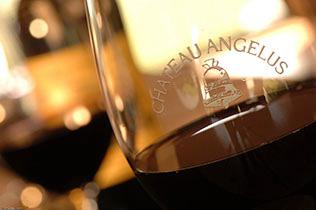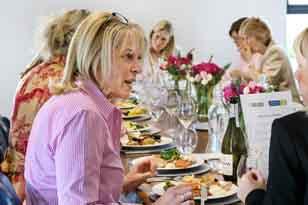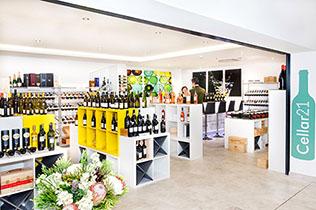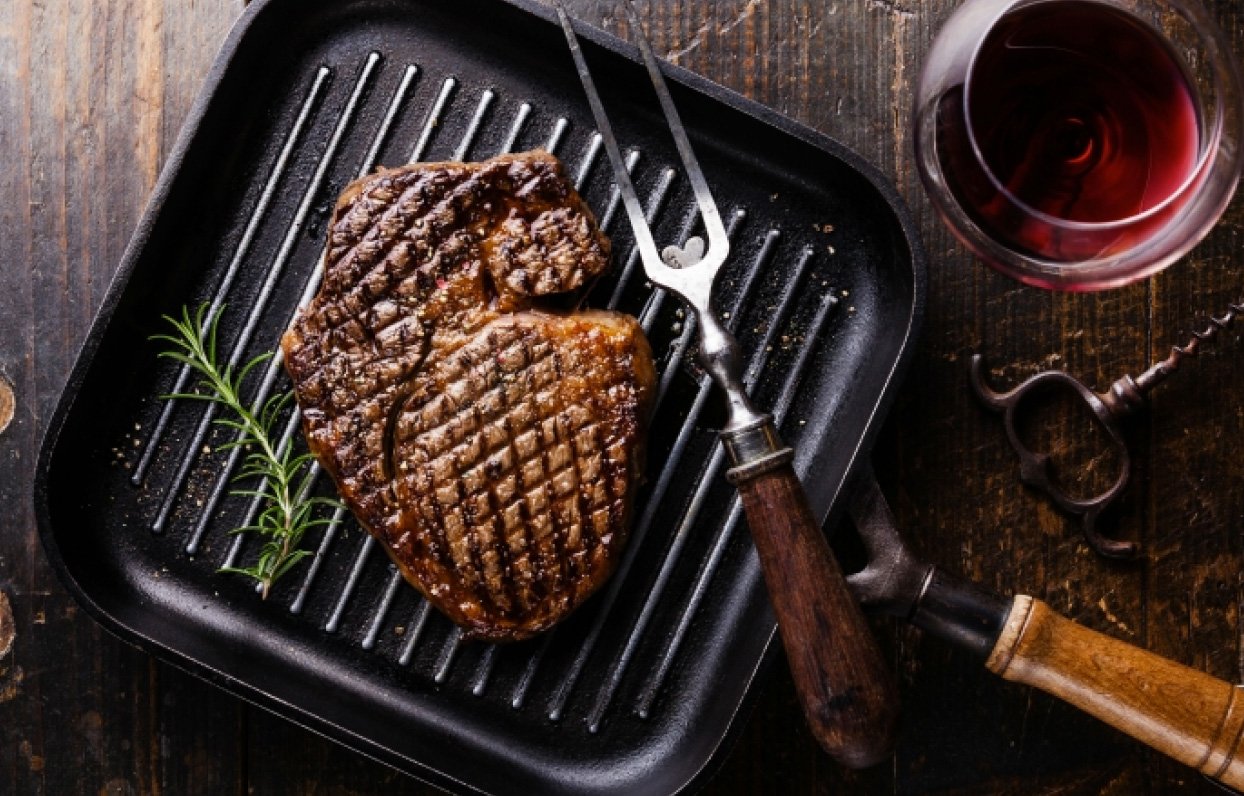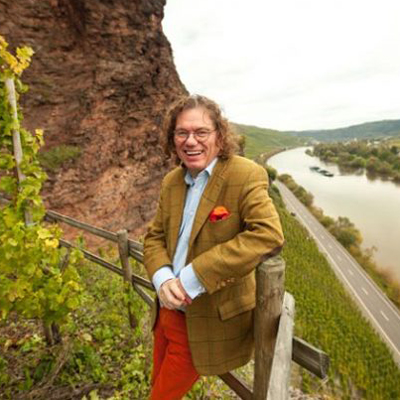

Ernst Loosen
Winemaker at Dr Loosen
"I’m proud that I was able to keep the winery in the family – it was a 200-year tradition. And I’m happy that I was able to persuade my younger brother, Thomas, to join me a few years later. He’s extremely well organized and has the whole production and export operation running very smoothly."
Biography
Born into a great tradition of winemaking Ernst Loosen (pronounced loh-zen) has spectacularly brought the Dr Loosen wines into 21st century. Through years of study, travel and dedication he has been awarded many wine accolades and we believe his wines are some of the best Germany has to offer.
When Ernst Loosen assumed ownership in 1988, he realized that with ungrafted vines averaging 60 years old, in some of Germany’s best-rated vineyards, he had the raw materials to create stunningly intense, world-class wines. To achieve this, Ernst dramatically reduced his crop size and stopped all chemical fertilisation, preferring only moderate use of organic fertilizers. And, most importantly, he turned to gentler cellar practices that allow the wine to develop its full potential with a minimum of handling and technological meddling.
Q & A
How did you get started in the wine trade?
When I was young, I liked wine and had been to the winemaking school in Geisenheim, but wasn’t really interested in going into the wine business. I was more interested in archeology and Roman history. But when I was studying archeology at the University of Mainz, my father fell seriously ill. My mother issued an ultimatum to the family: one of you kids has to take over the wine estate, or we’ll sell off the vineyards. With no real employment prospects as an archeologist, I was the only one in a position to take it on. So I did it. That was 37 years ago!
What has surprised you about being a winemaker?
The truly surprising thing was just how simple it is to make a great wine. A lot of work goes into it, of course, but with minimal-intervention winemaking, the process is not very complicated. You just need to pick good-quality fruit, maintain a clean cellar, and let nature do the work. The real challenge is in selling the wines once you’ve made them!
Could you provide a brief description of the winery and vineyards?
Our family has been growing and producing wine for over 220 years. When I took over the estate, I inherited some wonderful old vineyards, with ungrafted vines up to 130 years old. Since then, we have acquired more vineyards and now have holdings in 11 top-rated Grosse Lage sites in the Middle Mosel, as well in several Erste Lage and village sites. From the beginning, our idea was to focus on those Grosse Lage vineyards, to produce the best wines possible and to bring back the concept of vineyard classification, which had been abandoned with the 1971 German wine law.
What goals in winemaking are you still working to acheive?
With winemaking, you can never stand still. You can always improve what you are doing. But it becomes exponentially more difficult the closer you get to your ideal of perfection. That last five percent of improvement takes more work than the first 95 percent. And you never get all the way there, of course. There’s always something more you can do to get the most out of the wines in each vintage. So we just keep working and learning to get the small, incremental improvements that come with more and more experience.
What is your winemaking philosophy?
My philosophy has always been, “A great wine begins in your head.” By that, I mean that you first must know the great wines of the world, through extensive tasting experience, and then develop a clear mental vision for the wines that you want to produce yourself. Only then can you understand the dedication, the passion and the attention to small details that go into making a memorable wine that will give you an authentic taste of the land where it was grown. In our case at Dr. Loosen, the goal is to make wines that clearly express the cool-climate nature of the Mosel valley and the unique character of each vineyard site. With three distinct soil types, various vineyard exposures, and very old ungrafted vines, we have a fascinating palette with which to work.
Who has influenced your winemaking style the most?
My two great-grandfathers. Dr. Loosen is an amalgamation of two wine estates. One is from my father’s side, in Ürzig, where my great-grandfather Peter Loosen made only dry Rieslings. The other is from my mother, who came from the Prüm family, which had the tradition for wines with sweetness. Her grandfather, Zacharias Bergweiler-Prüm, was a major wine producer in Wehlen.
When I took on the estate, in 1987, I continued the Prüm tradition of winemaking, which was the dominant style for Mosel wines at that time. In 2008, I tasted for the first time a 50-year-old dry Riesling from my paternal great-grandfather and was stunned. Since then, we’ve been re-learning how they made both styles of wine in those days, with rigorous harvest selection, spontaneous fermentations in fuder casks and many experiments with extended barrel maturation to find the right balance. Ultimately, I’m trying to recapture the ways of viticulture and winemaking that were used when German Rieslings were the most expensive wines on the planet, regardless of the style.
What is your most exciting grape variety to work with?
Riesling and Pinot Noir. For me, Pinot Noir and Riesling are red and white twins because these two grape varieties have so many things in common. Both varieties are cool-climate grapes that show the soil where they’re grown so dramatically. Also, they both have the potential for exceptional age-ability, which for me is an essential element of a truly great wine.
What is one of your favourite varietals to work with, and why?
Riesling is the undisputed king of white grape varieties. There is no other variety that can so precisely reflect the nature of where it was grown and the personality of the winemaker. It is also the only variety that can be produced in such an astonishing spectrum of styles, from bone dry to nobly sweet and everything in between.
How do you know when you have a particularly good vintage on your hands?
Even if everything looks perfect during the growing season and the harvest, you can never really be sure about the quality of a vintage until you have the finished wines in your glass. But it’s only with some age that you see the greatness of a vintage. My grandfather always told me that you need at least 10 years for a wine to truly show you how great it will be.
If you could make wine anywhere else in the world, where would it be?
Well, aside from my winemaking projects in Oregon (Appassionata Estate), Washington (Eroica Riesling), and Australia (Riesling collaboration with Jim Barry Wines), I’ve always wanted to make wine in Burgundy. And now I’m doing it! In 2019, I acquired the east wing of the 15th century Le Vieux Château de Puligny-Montrachet and began work on a multi-year restoration project. I’m now working with a friend and long-time collaborator in Burgundy to source and produce a limited range of wines. They are being bottled under the name Perron de Mypont, who was the original owner of the château.
If you had to recommend just one of your wines to a customer, which would it be, and why?
I would recommend one of our Grosses Gewächs Réserve wines, which are the epitome of what we’re trying to achieve with dry wines from three of our finest old-vine Grosse Lage sites. They are produced the way my great-grandfather made wines, with two years of barrel maturation and a further four years of bottle age before we release them. They are dry wines, but they are beautifully balanced and harmonious, with a fine extract sweetness on the finish that makes them incredibly evocative of their terroir.
Mindful winemaking (organic/biodynamic/sustainable) is becoming increasingly important to our customers, is this something you actively employ at the winery?
You know, for 2,000 years of wine making and wine growing on the Mosel they didn't employ fertilisation. So we have been going back to this old way of thinking. Let nature do things itself a little bit more. Also with the wine making, it's exactly the same. These are all the things I have been implementing; trying to find out what they did 130 years ago. There must be a reason that Mosel wines were the once the most expensive in the world, two or three times more expensive than Ch. Latour and Ch. Margaux.
Consumers are becoming increasingly conscious of their impact on the planet and are trying to be more sustainable. Is this (sustainability) something you actively employ at the winery?
We are constantly working to improve our viticulture in order to grow the highest quality fruit and to adapt to the warming climate, while making our vineyard work more environmentally and economically sustainable. Labour costs are quite high in the steep vineyards we have here in the Mosel, because much of work has to be done by hand. So we have been changing the trellis system, wherever possible, to create a more manageable fruit zone, better canopy management and less back-breaking working conditions for the harvest team.
In the cellar, our future is rooted in the past. My fascination with ancient history has led me to unearth the more recent history of winemaking in the days of my great-grandfathers, 100 to 150 years ago. I refer to this period as the time of ‘historical winemaking’, which had benefited from centuries of ‘learning by doing’ and from continuous improvement in viticulture and vinification – but before the introduction of modern technology and chemical-based agriculture. What I’ve learned is that the more patient approach of those days – when they had very little technology, but plenty of time – provides the key to producing wines that represent their individual terroirs in a more expressive and authentic manner.
In 2012, we achieved EcoStep certification, which is a sustainability and integrated management certification endorsed by the German government. It covers all aspects of environmental sustainability, worker health, energy efficiency, waste reduction and water conservation in both the vineyards and the cellar.
How has climate change impacted your winemaking?
A important topic! So far, to be perfectly honest, the warming climate has been good for winegrowers in Germany. We’ve had to adapt our viticulture and harvest decisions, naturally, but right now we are enjoying an exceptional run of fully ripe vintages, which were not very common just 50 years ago. The big question, of course, is where will we be in another 50 years?
I have many more thoughts on this topic, which you can read here.
What is the best vintage that you have made?
An impossible question! Every vintage, and every wine, are like children to me. Every year, you try to make the best wines possible with what nature gives you. They are all different and are sometimes difficult when young, but as a winemaker you love them all for their individual qualities and cannot choose a favourite.
What are your thoughts on the perception of German (and/or Mosel) wines in today’s fine wine market?
I’ve been running around for over 30 years preaching about Riesling and it’s slowly coming back to the high reputation it had at the beginning of the 20th century. Riesling is still a small part of the wine market, however, and probably always will be. But we’ll keep on preaching about the amazing diversity and versatility of Riesling – it truly is a remarkable grape and people usually love it if you can just get them to try it.
In particular, high-quality dry-style German Rieslings are gaining in popularity around the world as today’s consumers discover how versatile, full-flavoured and food-friendly they are. However, while modern palates tend to prefer dry wines overall, there is still a larger quantity of off-dry Riesling sold globally. But no matter the style, Riesling is deeply satisfying for wine lovers who prefer intensely aromatic wines with energy, pure flavours and a crisp, refreshing finish.
What is your favourite restaurant, and why?
Any restaurant that has great food! There are many great restaurants that I love, so it’s impossible to choose just one. But a local example of the type of restaurant that I prefer is Schanz in Piesport. What I like about it is the elegance and precision of the cooking and the fact that they focus on fish dishes. The food is just brilliant, the dishes beautifully prepared and from start to finish just absolutely delicious.
Name your desert island dish and wine to go with it…
Any tasty dish, with great wines and great friends.
What is your favourite wine, and who would you share it with?
I have a cellar full of favourites and I love to share them with friends over dinner at home.

